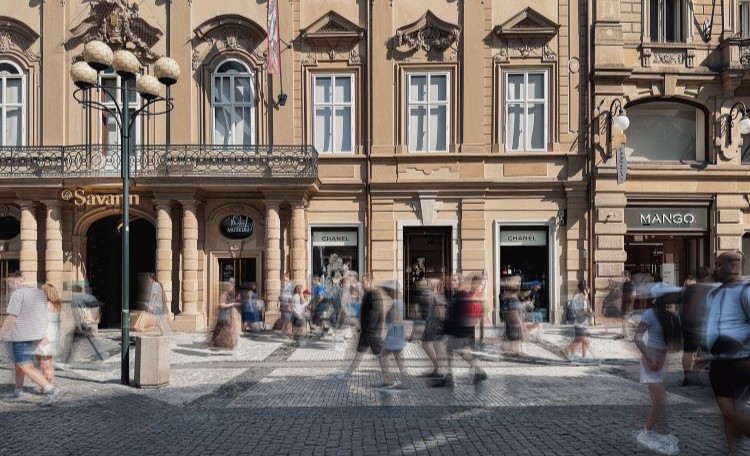A total of 260 million euros was invested in commercial properties in Czechia in the first quarter of this year; this is roughly 9% less than in the same period last year. Following a period of waiting, the mood among investors is optimistic again, with great interest in buying and a high amount of capital on the market. Nevertheless, transaction activity is low – there is a shortage of real properties for sale. The development in Prague is low across the sectors. This can be a benefit for those seeking to buy – new projects face low competition. In effect, investors’ demand for Prague is huge and logistic properties are an obvious favourite. With almost no vacancy, rents are growing steeply, thus reducing yield and pushing prices dramatically upwards.
Q1: Offices and Czech investors
Sales of office properties dominated the Czech market in the first quarter this year, accounting for almost two-thirds of the overall volume; the logistic sector accounted for almost one quarter. One half of the transactions were attributable to local investors, 30% to German investors and 20% to Singapore investors.
Two billion euros by the end of the year
The total expected amount of investment in 2021 should reach two billion euros, a 60% increase over last year and 70% of a five-year average.
Logistics are experiencing a record-breaking period
Logistics properties are at the top of investor preferences today. This is attributable to an increase in e-commerce and other segments where demand for storage space is increasing at a record-breaking pace. Such demand over a short period of time has caused a rapid increase in yield, and thus a dramatic change in price. In effect, the yield from good quality logistics properties has decreased from 5.5% to 4.5%; at stable rent amounts, this means a more than 20% increase in the value of the property within five months.
Michal Soták, Partner, Head of the Capital Markets team in the Czech Republic, Cushman & Wakefield: “This is a record-breaking trend – I have never encountered such a rapid increase in price and shift in yield in any sector of the commercial property market before. Demand on the part of occupiers is at a record high while the vacancy rate is at a record low – about just two per cent in Prague. This is aided by limited development; it is practically impossible to build storage facilities close to Prague anymore.”
The demand for this type of properties is generated primarily by companies focusing on e-commerce along with various shipping services such as food deliveries, which are currently on the rise (also thanks to the pandemic). These firms need storage facilities as close to big cities’ centres as possible, which drives growth in the urban or last-mile logistics segment. The result is a trend of relocating large central storage facilities to distant locations with lower rents, in turn moving buffer stores for e-shops and flexible shop supplies closer to big cities where they can cater to dynamic developments in demand in shops. Companies also often want to locate their headquarters, showroom and store in one site. Manufacturing firms also seek quality facilities, which, when combined, generates huge pressure on demand for storage space in premium locations.
In Czechia, halls and space for their development are literally running out, so investors tend to focus on markets where extensive development still allows them to buy logistics properties. Poland is the prime market of this type in Central Europe1/, accounting for 63% of the investment activity in the region in Q1.
Michal Soták, Partner, Head of the Capital Markets team in the Czech Republic, Cushman & Wakefield: “Demand exists in the Czech Republic, and if there was stock to transact, there would be high activity too. Yield is steeply decreasing in the logistics sector and will continue to. Both local and international investment funds are interested. They all have amassed huge capital but have nowhere to use it.”
Home office will not affect Prague’s office market very much
There are currently too few transactions to reliably single out a clear trend. For example, in the office market, it is only possible to derive any pricing trend based on the transactions completed in 2019 and 2020. Pricing increases were apparent at that time; yield was just below 4% last year.
Michal Soták, Partner, Head of the Capital Markets team in the Czech Republic, Cushman & Wakefield: “Of course, there is a debate on what changes in the office market the increase of home office work will prompt. A decrease in demand for office space is expected, but this will not have a major market impact in Prague where office space development is quite limited. While forecasts expected vacancy rates growing in excess of 10%, it is in reality just 7.6%, confirming the resilience of the segment.”
Investors return to retail
Retail is experiencing a return to optimism following a period of uncertainty, and this applies to all types of retail properties. In particular, projects involving supermarkets and hypermarkets remain highly attractive to investors. By contrast, transactions involving properties in Prague’s high streets, where the impact of the pandemic will be the longest and deepest, will be less common. Even there, though, we have seen activity on the part of occupiers in recent months, as they are trying to take advantage of the new market situation and open branches in locations that they could not afford previously. Investment-wise, it is still primarily local and regional players who are most active in the retail segment, though interest on the part of western capital can be expected soon, seeking value-add opportunities.
Michal Soták, Partner, Head of the Capital Markets team in the Czech Republic, Cushman & Wakefield: “This is not showing in the first quarter figures yet, but the transactions we are currently working on indicate that investors are coming back to retail. Accordingly, we can expect prices in the segment to grow in the future.”
No hotels are selling out
Similar to shops in Prague’s high street, hotels are also struggling with a decrease in footfall, primarily among international tourists. Investors together with hotel operators believe, though, that this is just a temporary situation that will end when the restrictions are lifted, people start travelling again and clients come back. The confidence in the Prague hospitality market is strong and a return to pre-pandemic figures is expected within about three years.
Michal Soták, Partner, Head of the Capital Markets team in the Czech Republic, Cushman & Wakefield: “The interest in Prague’s hotels among investors is huge, but there are no properties for sale. At the beginning of the pandemic, there were predictions of hotels being sold under pressure, but their owners believe that tourism will return to Prague, so they have not started selling with huge discounts and there has been no hotel sell-out.”
Alternative? Primarily rental residential properties
Alongside traditional groups of properties, alternative segments are gaining in attractiveness, but it will most likely take some time before transaction volumes start approaching those in the office and industrial markets.
The rental residential segment is talked about the most these days, with yields expected to be even more aggressive than in other segments: below 4%. Here, the rate of return for the investor is relatively lower than with office, logistics or retail properties, but the segment is gaining attraction because there are not and will not be many of these properties in the market, so they face little competition and their value will grow.
Michal Soták, Partner, Head of the Capital Markets team in the Czech Republic, Cushman & Wakefield: “This segment is becoming very popular among investors, though it will remain marginal rather than becoming major in the future. We are currently working on several transactions in the segment, but there are not more than ten investors focusing on it.”
Domestic and international investors have a different approach to investments in rental residential properties. Where the local investors prefer buying existing and leased buildings, which are rarely for sale on the market, international investors are more interested in forward deals. In this scheme, a developer builds a project further to an arrangement with an investor who undertakes to purchase it after completion. This transaction structure is problematic for local investors, partly due to regulation; as a result, international investors are more likely to be interested in it, as they are more flexible in this respect. They seek primarily projects within the broader centre of Prague, which they are already familiar with as a real estate market, while local investors look into all major Czech cities and towns.
Other alternative segments also pique the interest of investors who wish to buy such projects in the Czech Republic – whether they are residential projects for the elderly, flexible offices, last-mile logistics projects or data centres. For example, the latter are much in-demand among investors, but there are no projects in Prague to satisfy the demand. Investors have to look elsewhere – again, most often on the Polish market.
Poland rules the region
Poland has traditionally dominated the Central European market in terms of investments in real estate: compared with the other countries, its market is larger and offers more product for sale, since development is more extensive, quicker and easier. In effect, Poland accounted for almost two-thirds (63%) of all investment transactions in the region in the first quarter of this year, whereas Czech Republic accounted for 13%.
The total amount of investments into the region dropped by more than 22% year-on-year. However, the capital allocated to commercial properties remains very high considering the product offered, so an increase in investment activity can be expected once the coronavirus uncertainty subsides.
Czech market: stable, mature, credible
The Czech market is limited by low rates of development, and thus by a shortage of products to buy. The local funds have nowhere to invest their accumulated capital to, so they look over the border – mainly in Poland, Slovakia and Hungary. Logistics properties in Poland are the perfect targets for them now.
Prospective international investors also struggle with a lack of opportunities in Czechia; the limited supply of product hinders their inflow and the local transaction activity. On the other hand, limited development is also a benefit for the market: to an extent, the lack of competing schemes guarantees newly built properties a somewhat monopoly position, and when investors do not expect values (capital, rents or vacancy rates) to fluctuate on a market, they perceive that market as mature. This causes prices to increase.
Michal Soták, Partner, Head of the Capital Markets team in the Czech Republic, Cushman & Wakefield: “The local market supply is structurally limited, which protects schemes from competition effects – which cannot be said of e.g. Warsaw where development is much greater. As a result, investors are highly interested in Prague and will continue to be, since they trust the local market.”
1/ For the purposes of this release, the Central European region includes the Czech Republic, Poland, Slovakia, Hungary and Romania.










